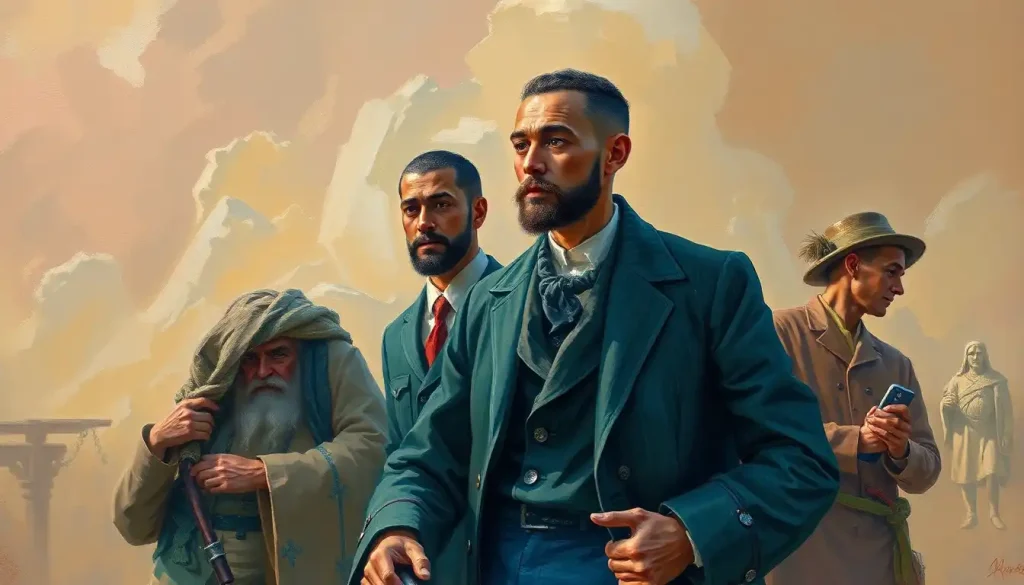From visionary tech titans to retail revolutionaries, the world’s most inspiring entrepreneurs have transformed industries and reshaped our daily lives with their groundbreaking ideas and relentless drive. These trailblazers have not only built empires but have also left an indelible mark on the world, inspiring countless others to pursue their dreams and push the boundaries of what’s possible.
But what exactly makes a successful entrepreneur? Is it their unwavering determination, their ability to spot opportunities where others see obstacles, or perhaps their knack for assembling dream teams? The truth is, it’s a potent cocktail of all these qualities and more. Entrepreneurs are the lifeblood of innovation, the risk-takers who dare to challenge the status quo and bring fresh ideas to life.
Their impact on the global economy is nothing short of staggering. From creating jobs to driving technological advancements, entrepreneurs are the engines of growth that keep our world spinning. They’re the ones who look at a problem and think, “I can fix that,” then roll up their sleeves and get to work.
In this journey through the world of entrepreneurship, we’ll meet some of the most fascinating figures who’ve shaped our modern landscape. From tech wizards who’ve connected billions of people to retail mavericks who’ve revolutionized how we shop, and from financial gurus who’ve redefined wealth management to social entrepreneurs tackling the world’s most pressing issues – buckle up, because we’re in for one heck of a ride!
Tech Titans: Revolutionary Entrepreneurs in the Digital Age
Let’s kick things off with a bang and dive into the world of tech titans. These digital revolutionaries have not only changed the way we interact with technology but have fundamentally altered the fabric of our society.
First up, we’ve got the late, great Steve Jobs. Now, if you’ve never heard of Steve Jobs, you might want to check if you’ve been living under a rock (or perhaps an android). This visionary co-founder of Apple Inc. didn’t just give us sleek gadgets; he reimagined how we interact with technology. From the iconic iPhone to the game-changing iPad, Jobs had an uncanny ability to anticipate what consumers wanted before they even knew they wanted it.
But Jobs wasn’t just about creating pretty devices. He was a master of marketing, a perfectionist to the core, and had an almost obsessive attention to detail. His famous “Reality Distortion Field” – the term used to describe his ability to convince anyone of practically anything – became the stuff of Silicon Valley legend.
Next on our list is Mark Zuckerberg, the hoodie-wearing wunderkind who turned a dorm room project into a global phenomenon. Most Successful Entrepreneur Businesses: Inspiring Stories and Strategies often start with a simple idea, and Facebook was no exception. Zuckerberg’s vision of connecting people online has reshaped how we communicate, share information, and even how we view privacy in the digital age.
Love him or hate him (and let’s face it, opinions are pretty divided), there’s no denying Zuckerberg’s impact on our daily lives. From reuniting long-lost friends to sparking global movements, Facebook has become an integral part of the social fabric for billions of people worldwide.
Now, let’s talk about the man who made “Prime” more than just a mathematical term – Jeff Bezos. The founder of Amazon started with a simple idea: selling books online. Fast forward a couple of decades, and Amazon has become the “everything store,” revolutionizing e-commerce and changing consumer expectations forever.
But Bezos didn’t stop at retail. From cloud computing (Amazon Web Services) to space exploration (Blue Origin), his entrepreneurial spirit seems to know no bounds. His famous “Day 1” philosophy, which emphasizes maintaining a start-up mentality even as a large corporation, has become a mantra for aspiring entrepreneurs worldwide.
Last but certainly not least in our tech titan roundup is Elon Musk. If there’s anyone who embodies the phrase “shoot for the moon,” it’s this South African-born entrepreneur. From electric cars (Tesla) to space exploration (SpaceX) to high-speed transportation (Hyperloop), Musk’s ventures read like a sci-fi novel come to life.
What sets Musk apart is his audacious goal-setting. He’s not content with incremental improvements; he wants to revolutionize entire industries. Whether it’s reducing global dependence on fossil fuels or making humans a multi-planetary species, Musk thinks big – really big.
Retail and Fashion Moguls: Transforming Consumer Industries
Now, let’s shift gears and take a stroll down the aisles of retail and fashion entrepreneurship. These visionaries have changed not just what we buy, but how we buy it and how we express ourselves through what we wear.
First up, we have Sam Walton, the man behind the retail behemoth Walmart. Walton’s story is a testament to the power of a simple idea executed brilliantly. His vision? Bringing affordable goods to rural America. What started as a single store in Rogers, Arkansas, grew into the world’s largest retailer, revolutionizing supply chain management and forever changing the discount store landscape.
Walton’s famous “Ten Foot Rule” – making eye contact and greeting any customer within ten feet – became a cornerstone of Walmart’s customer service philosophy. His down-to-earth approach and relentless focus on keeping prices low made him a folk hero in American business.
Switching from everyday low prices to haute couture, let’s talk about Coco Chanel. Long before “girl boss” was a hashtag, Gabrielle “Coco” Chanel was redefining women’s fashion and challenging societal norms. Chanel didn’t just design clothes; she created a new vision of femininity, one that prioritized comfort and elegance over the restrictive fashions of her time.
From the little black dress to the iconic Chanel No. 5 perfume, her innovations have stood the test of time. Chanel’s entrepreneurial spirit was evident in how she built her brand, turning her name into a symbol of luxury and sophistication that continues to resonate today.
Speaking of iconic American fashion, we can’t overlook Ralph Lauren. Starting with a line of wide ties sold out of a drawer in the Empire State Building, Lauren built an empire that embodies the American dream. His brand doesn’t just sell clothes; it sells a lifestyle – one of preppy elegance and aspirational living.
Lauren’s genius lay in his ability to create a cohesive brand identity that extended beyond clothing to encompass home furnishings, fragrances, and even restaurants. His story is a masterclass in brand building and the power of a clear, consistent vision.
Last but certainly not least in our fashion roundup is Sara Blakely, the founder of Spanx and the youngest self-made female billionaire in America. Blakely’s journey from selling fax machines door-to-door to creating a global shapewear empire is the stuff of entrepreneurial legend.
What sets Blakely apart is her combination of innovation and marketing savvy. She not only created a product that solved a common problem for women but also marketed it in a way that was relatable and empowering. Her success story is a powerful reminder that sometimes the best business ideas come from solving our own everyday problems.
Financial Wizards: Entrepreneurs Who Reshaped Wall Street
Now, let’s dive into the world of high finance, where our next group of entrepreneurs have made their mark. These financial wizards have not only amassed incredible personal wealth but have also changed the way we think about money and investments.
First up is Warren Buffett, the “Oracle of Omaha” himself. Buffett’s journey from a young boy selling chewing gum door-to-door to becoming one of the world’s wealthiest individuals is nothing short of remarkable. As the CEO of Berkshire Hathaway, Buffett has become synonymous with value investing, demonstrating an uncanny ability to pick winning stocks and companies.
But what truly sets Buffett apart is his down-to-earth demeanor and ethical approach to business. His annual shareholder letters are eagerly anticipated not just for their financial insights, but for their homespun wisdom and straightforward communication style. Buffett’s pledge to give away the majority of his wealth to philanthropic causes has also set a new standard for billionaire philanthropy.
Next, we have Michael Bloomberg, a man who wore many hats – entrepreneur, politician, and philanthropist. Bloomberg’s entrepreneurial journey began when he was fired from his job at Salomon Brothers. Instead of wallowing, he used his severance to start Innovative Market Systems, which later became Bloomberg L.P.
Bloomberg’s company revolutionized the financial industry by providing real-time market data, analytics, and news to financial professionals. His success in business eventually led him to politics, serving three terms as the mayor of New York City. Bloomberg’s story is a testament to the power of resilience and the ability to spot opportunities in adversity.
Now, let’s talk about Ray Dalio, the founder of Bridgewater Associates, the world’s largest hedge fund. Dalio’s approach to investment and management is nothing short of revolutionary. His philosophy of “radical transparency” and “idea meritocracy” has not only led to incredible financial success but has also influenced management thinking across industries.
Dalio’s book “Principles” has become a bible of sorts for many in the business world, offering insights into his unique approach to decision-making and organizational culture. His emphasis on learning from mistakes and constantly refining one’s approach resonates with entrepreneurs across all sectors.
Last but not least in our financial roundup is Abigail Johnson, the CEO and chairman of Fidelity Investments. As one of the most powerful women in finance, Johnson has steered Fidelity through the challenges of the digital age, embracing new technologies like blockchain and cryptocurrencies.
What’s particularly inspiring about Johnson’s story is how she’s navigated the challenges of leading a family business. Taking over from her father, she’s managed to respect Fidelity’s legacy while pushing the company to innovate and adapt to changing market conditions. Her leadership style, combining traditional values with forward-thinking strategies, offers valuable lessons for entrepreneurs in any field.
Social Entrepreneurs: Making a Difference Through Business
Now, let’s shift our focus to a group of entrepreneurs who are proving that doing good and doing well in business aren’t mutually exclusive. These social entrepreneurs are tackling some of the world’s most pressing issues through innovative business models.
First up is Muhammad Yunus, the founder of Grameen Bank and a pioneer in microcredit. Yunus’s revolutionary idea was simple yet profound: provide small loans to the poorest of the poor, particularly women, to help them start businesses and lift themselves out of poverty.
This concept, which earned Yunus a Nobel Peace Prize, challenged traditional banking norms and demonstrated that the poor could be creditworthy. The success of Grameen Bank has inspired similar microfinance initiatives worldwide, showing how entrepreneurial thinking can address deep-rooted social issues.
Next, we have Blake Mycoskie, the founder of TOMS Shoes and the creator of the “One for One” business model. Mycoskie’s idea was brilliantly simple: for every pair of shoes sold, TOMS would donate a pair to a child in need. This model not only created a successful business but also addressed the issue of shoelessness in developing countries.
Innovative Entrepreneurs: Pioneering Business Solutions for the Future like Mycoskie have shown that consumers are willing to support brands that align with their values. The success of TOMS has inspired many other companies to incorporate giving into their business models, creating a new paradigm of conscious consumerism.
Now, let’s talk about Leila Janah, the founder of Samasource. Janah’s innovative approach to tackling global poverty was to provide digital work opportunities to people living in impoverished areas. By training people in digital skills and connecting them with work from major tech companies, Samasource has created a sustainable model for economic empowerment.
Janah’s work challenges the traditional notion of charity, showing how providing dignified work opportunities can be more effective than handouts in fighting poverty. Her approach exemplifies how technology and entrepreneurship can be harnessed to create lasting social change.
Last but not least in our social entrepreneur roundup is Scott Harrison, the founder of charity: water. Harrison’s journey from New York City nightclub promoter to clean water advocate is a powerful story of personal transformation and social impact.
charity: water’s innovative approach includes using 100% of public donations for water projects (with operating costs covered by private donors) and providing GPS coordinates and photos of completed wells to donors. This transparency has helped the organization build trust and attract support in a sector often plagued by skepticism.
Harrison’s work reminds us that entrepreneurial skills like marketing, storytelling, and innovation are just as crucial in the non-profit world as they are in for-profit businesses. His success in mobilizing people around the cause of clean water demonstrates the power of combining passion with entrepreneurial acumen.
Lessons from History: Iconic Entrepreneurs Who Shaped Industries
As we wrap up our entrepreneurial journey, let’s take a step back in time to look at some historical figures who laid the groundwork for modern entrepreneurship. These titans of industry not only built successful businesses but also fundamentally changed the way entire sectors operated.
First on our list is Henry Ford, the man who put America (and much of the world) on wheels. Ford didn’t invent the automobile, but he revolutionized its production with the assembly line, making cars affordable for the average American. His innovation went beyond manufacturing – Ford doubled his workers’ wages, creating a new middle class that could afford the very products they were producing.
Ford’s famous quote, “If I had asked people what they wanted, they would have said faster horses,” encapsulates his innovative spirit. He didn’t just give people what they thought they wanted; he created something they didn’t even know they needed. This forward-thinking approach continues to inspire entrepreneurs today.
Next up is Walt Disney, a man whose name has become synonymous with imagination and entertainment. Disney’s journey from a struggling artist to the creator of a global entertainment empire is a testament to the power of perseverance and vision.
What set Disney apart was his ability to see the potential in new technologies. From introducing synchronized sound in cartoons with “Steamboat Willie” to creating the first full-length animated feature with “Snow White and the Seven Dwarfs,” Disney consistently pushed the boundaries of what was possible in animation and entertainment.
Now, let’s talk about Madam C.J. Walker, a true pioneer in every sense of the word. Born to former slaves and orphaned at a young age, Walker became the first female self-made millionaire in America. Her line of hair care products for African American women not only made her wealthy but also provided economic opportunities for thousands of black women who worked as sales agents.
Walker’s success in the face of overwhelming odds – as a woman, as an African American, and as someone born into poverty – is a powerful reminder that entrepreneurship can be a path to empowerment and social change. Her philanthropic efforts and advocacy for African American rights further cemented her legacy as more than just a successful businesswoman.
Last but certainly not least is John D. Rockefeller, the oil tycoon who became America’s first billionaire. Rockefeller’s Standard Oil Company dominated the oil industry, at one point controlling 90% of oil production in the United States. While his business practices were often controversial, his impact on the industry and on modern business practices is undeniable.
What’s particularly interesting about Rockefeller is how he transformed in his later years, becoming one of the world’s greatest philanthropists. His foundations have supported medical research, education, and scientific advancement, showing how entrepreneurial success can be leveraged for the greater good.
The Entrepreneurial Spirit: Lessons and Inspirations
As we reflect on these remarkable entrepreneurial journeys, certain common threads emerge. Whether we’re talking about a 19th-century oil baron or a 21st-century tech visionary, successful entrepreneurs share some key traits.
First and foremost is the ability to spot opportunities where others see obstacles. Successful Entrepreneurship Stories: Inspiring Tales of Innovation and Perseverance often begin with someone looking at a problem and thinking, “There’s got to be a better way.” This knack for identifying unmet needs or inefficiencies in existing systems is often the spark that ignites entrepreneurial ventures.
Resilience is another crucial trait. Every entrepreneur we’ve discussed faced setbacks, failures, and moments of doubt. What set them apart was their ability to bounce back, learn from their mistakes, and keep pushing forward. As Thomas Edison famously said, “I have not failed. I’ve just found 10,000 ways that won’t work.”
Innovation is, of course, at the heart of entrepreneurship. Whether it’s Steve Jobs reimagining the personal computer, Coco Chanel redefining women’s fashion, or Muhammad Yunus creating a new model of banking, successful entrepreneurs are never content with the status quo. They’re always looking for ways to improve, disrupt, and revolutionize.
Another common thread is the ability to build and lead teams. No entrepreneur achieves success in isolation. The ability to inspire others, to communicate a vision, and to bring together diverse talents is crucial. This is as true for a retail empire like Walmart as it is for a tech giant like Facebook.
As we look to the future, the landscape of entrepreneurship continues to evolve. The digital revolution has lowered barriers to entry in many industries, allowing for a new wave of entrepreneurs to emerge. Small Business Entrepreneur Examples: Inspiring Stories of Success are becoming increasingly common, as technology enables individuals to reach global markets from their living rooms.
At the same time, there’s a growing emphasis on social responsibility and sustainability in business. The success of companies like TOMS and the rise of B Corporations (businesses that balance purpose and profit) suggest that future entrepreneurs will need to consider their impact on society and the environment alongside traditional measures of success.
Artificial intelligence, blockchain, renewable energy, and biotechnology are just a few of the fields ripe for entrepreneurial innovation in the coming years. As these technologies mature, they’ll create new opportunities for visionary thinkers to create value and solve global challenges.
For aspiring entrepreneurs, the stories we’ve explored offer both inspiration and practical lessons. They remind us that success often comes from unexpected places, that failure is a natural part of the journey, and that with persistence and innovation, it’s possible to change the world.
Entrepreneur Types: Exploring the Diverse World of Business Innovators shows us that there’s no one-size-fits-all model for entrepreneurial success. Whether you’re a tech whiz with a game-changing app idea, a fashion designer with a unique aesthetic, or a social entrepreneur with a passion for change, there’s room for your vision in the entrepreneurial landscape.
The key is to start. As Reid Hoffman, the co-founder of LinkedIn, famously said, “If you are not embarrassed by the first version of your product, you’ve launched too late.” So take that first step, embrace the uncertainty, and who knows? Your name might just be the one future generations read about when they’re looking for entrepreneurial inspiration.
In the end, entrepreneurship is about more than just making money or building successful businesses. It’s about having the courage to pursue a vision, the resilience to overcome obstacles, and the creativity to imagine a different future. It’s about seeing possibilities where others see problems, and having the drive to turn those possibilities into reality.
So here’s to the dreamers, the risk-takers, the innovators – the entrepreneurs who dare to think differently and act boldly. They remind us that with passion, perseverance, and a little bit of luck, we all have the potential to leave our mark on the world. Who knows? The next world-changing idea might just be yours.
References
1. Isaacson, W. (2011). Steve Jobs. Simon &












Would you like to add any comments? (optional)